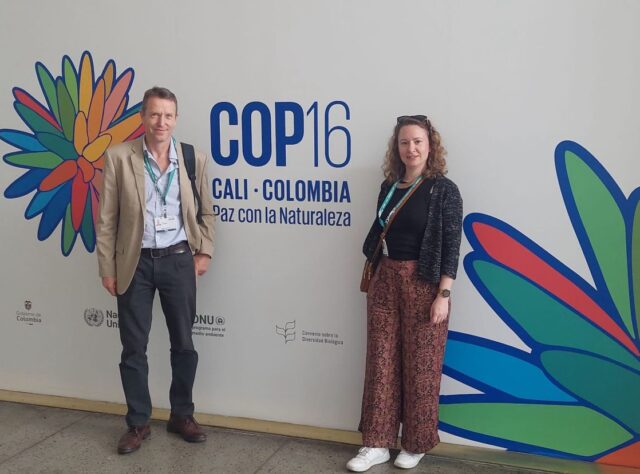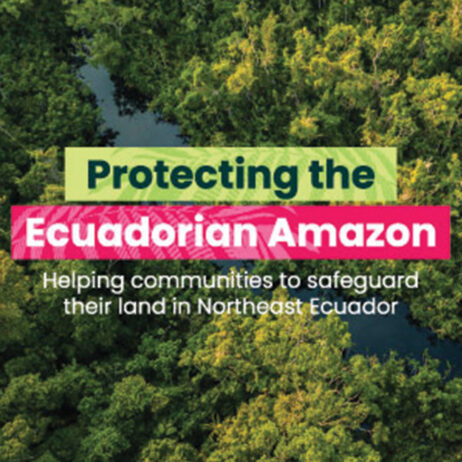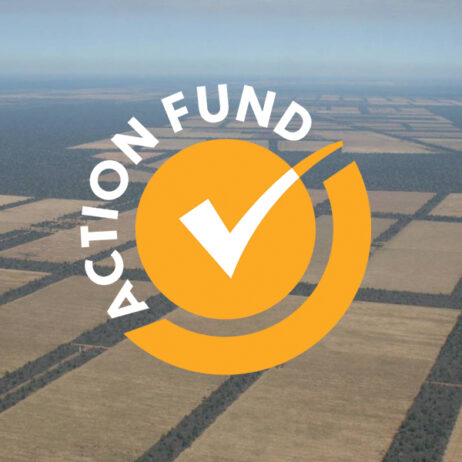
Dr Richard Cuthbert and Charlotte Beckham at the Convention on Biological Diversity's COP16 in Cali, Colombia. Credit: Richard Cuthbert
By Dr Richard Cuthbert, Director of Conservation at World Land Trust
COP16 has now concluded in Cali, Colombia, and like many others who attended I’ve been reflecting on the official outcomes of the meeting, as well as some of the main themes that emerged from the numerous side meetings and events.
The official government-led outcomes once more left a lot unresolved and to be desired, with critically there being no consensus on how nature and biodiversity should be funded or how the 2030 targets will be monitored. Until richer governments step up to really provide the funding to protect their own biodiversity and to support countries in the Global South with the fewest resources and most biodiversity then the COP process remains an expensive talking shop and on the verge of parodying the often quoted definition of insanity and doing the same thing over and over again while expecting different results.

Until richer governments step up to really provide the funding to protect their own biodiversity and to support countries in the Global South with the fewest resources and most biodiversity then the COP process remains an expensive talking shop. Credit: Richard Cuthbert
In contrast, it was good to see official progress in the recognition and incorporation of indigenous peoples and local communities into the formal decision making of the UN biodiversity process; agreement for a global levy on products that profit from the genetic diversity of nature to help fund conservation actions in countries with high biodiversity; and agreement that the biodiversity and climate crises are inextricably interlinked and should be tackled in synergy. Important steps, but still in marked contrast with the gulf of funding that is required to really tackle biodiversity loss and the level of government subsidies that harm nature.
Outside of the official government process there were innumerable meetings and events highlighting important issues and developments from the recognition for the need for human rights principles to be fully incorporated into conservation activities, to advances in the use of AI as a tool for the rapidly increasing complexity of data that can now be gathered (from remote sensing, eDNA, acoustics, mobile phones, and many other sources).

The progress of COP16 is not only in the main meetings such as these, but also smaller events and side meetings. Credit: Richard Cuthbert
Two prominent topics in the side meetings were firstly the huge interest (standing room only at some meetings) in defining a standardised set of metrics for measuring biodiversity and progress in the protection of nature, but with a plethora of competing approaches and standards being launched and promoted at the same time. And secondly the great interest in the developing area of biodiversity credits and moves to recognise biodiversity as an asset class to promote the required investment in protecting the natural world, along with competing meetings warning of the risks of this approach. Whether such approaches will work is uncertain, but in the absence of governments finding the funds to take the biodiversity crisis seriously, an alternative is urgently required.
What was clear to me from COP16 is that civil society and organisations like World Land Trust and our network of strong local conservation partners are vitally important for providing solutions to the biodiversity crisis through the protection, restoration and connection of critical areas of land and safeguarding the biodiversity these contain. And secondly, that there is a growing recognition and interest from responsible companies and investors that biodiversity is of direct relevance for their business models, and needs to be fully valued and protected.

The COP16 summit was also a wonderful opportunity for Richard Cuthbert and Charlotte Beckham to catch up with over 15 WLT partners. Credit: Richard Cuthbert
Such solutions and the recognition of the value of biodiversity does not require further meetings: it just need immediate actions.
If you would like to support our work delivering immediate conservation action on the ground, please click here. Thank you.

